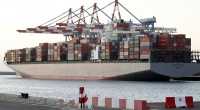The Central Bureau of Statistics (CBS) reported that Israel's trade deficit recorded a 34.6% increase in 2012, as exports fell due to declining global demand.
The CBS noted that exports of goods in 2012 recorded a slight rise of 0.2% compared to a 7.1% increase in the import of goods. The trade deficit was US$18.25 billion last year, up from US$14.61 billion in 2011.
The last quarter of 2012 recorded a 10.1% drop in export of goods and a 17.8% decline in the import of goods. Israel's exports totaled US$54.02 billion in 2012, down from US$58.13 billion in 2011; imports were worth US$72.74 billion, down from US$74.47 billion.
In terms of local currency, in 2012, imports of goods totaled NIS278.4 billion compared to NIS260.0 billion in 2011. Imports (excluding ships, aircraft, diamonds and fuels) increased 6.3%.
Breakdown by import destinations shows that 38% of imports were inputs for industry, 15% imports of consumer goods, 14% were import of investment goods, 22% imports of fuels and 11% import of ships, aircraft and diamonds.
Import of fuels totaled NIS62.0 billion, an increase of 27.0% compared to 2011. Export of goods (excluding ships, aircraft and diamonds) totaled NIS176.1 billion. Industrial exports totaled NIS170.7 billion, a rose of 4.4% compared to 2011. Agricultural exports rose by 9.0% and totaled NIS5.4 billion.
Breakdown of industrial exports by technological intensity shows that high technology industries represent 48% of total industrial exports (excluding diamonds), medium high technology industries 31%, medium low technology industries 16% and low technology industries 5%. Israel's economy grew an estimated 3.3% in 2012, its slowest pace in three years due to scant export growth, but still outperformed many other developed countries.
Growth slowed from a 4.6% spurt in 2011, mainly due to recessions in Europe, Israel's largest trading partner, weak growth in the United States and slower growth in Asia.






